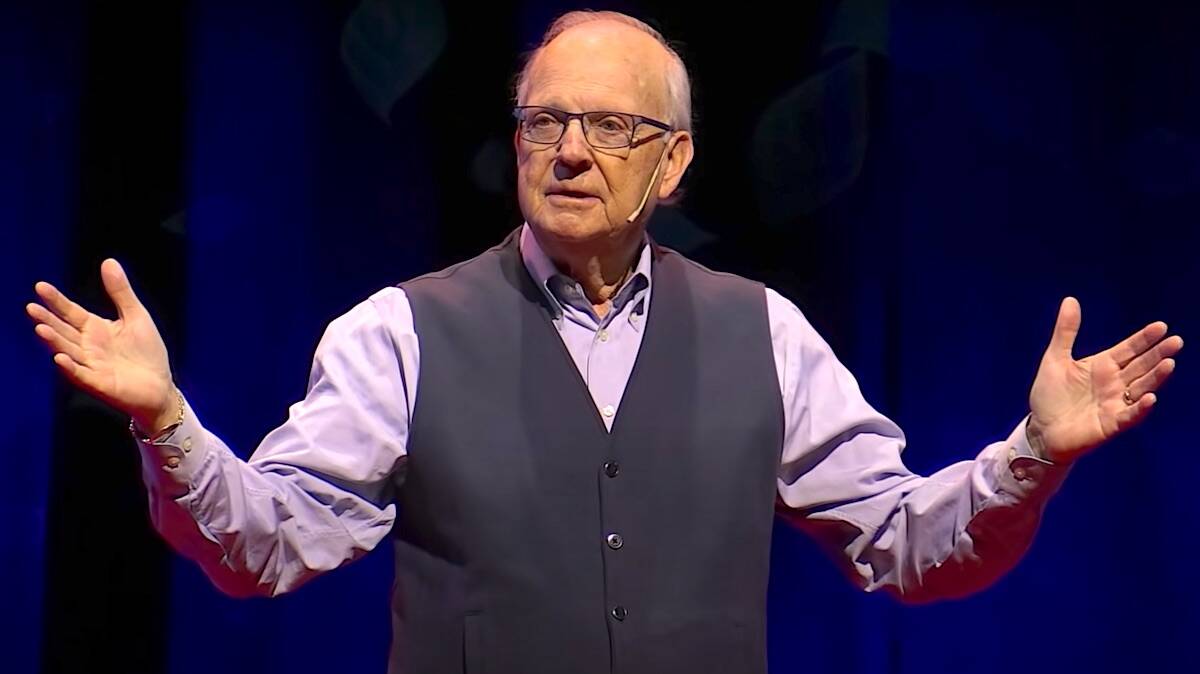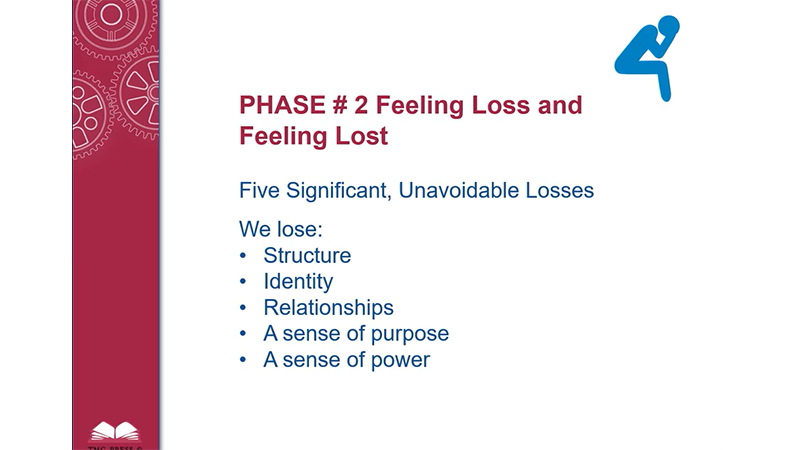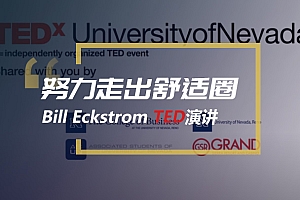2022年最受欢迎的TED演讲:退休的四个阶段

通过采访数百名退休人员,他发现了一个框架,可以帮助我们更好地理解我们生活中这一充满挑战的篇章……对许多人来说,这个框架可能会持续 30 年或更长时间。如果您退休了,本次演讲会让您更加清楚。如果你不是,你会更好地了解那个时候会发生什么。莱利深耕公共部门和私营部门40 年,可以说是一位卓有成绩的社会学专家。
在公共教育领域,他担任过教师、系主任、学监和教育总监。他还撰写了多本教科书,包括俄罗斯历史和世界宗教文本。在私营部门,他是一家国家财富管理公司的创始合伙人,着有六版销量超过 200,000 册的《理财教练》一书,并与当地顶级的基金公司合作了多本相关书籍。自从日常参与金融服务工作后,莱利就普遍感兴趣的主题研究和撰写了便于读者阅读的出版物,并根据这些出版物在全国举办研讨会。
想象一下从退休过程中享受到欣喜和欢乐!(Riley Moynes) 莱利博士在就他的研究接受采访时评论说:“我希望我当时领悟我现在对退休带来的心理挑战。这会让事情变得更清晰、更容易。”他最近的这本为老年人量身这下制的《退休的四个阶段》在出版后 12 个月内成为加拿大畅销书,并且是他 TEDx 演讲的基础。
在书中,他解释了他如何在退休的第一阶段跳华尔兹,在第二阶段挣扎,在第三阶段和现在的第四阶段尝试了十几次冒险,帮助其他人度过几乎每个人都面临的心理变化和挑战。退休。该演讲是在 TEDx 活动中使用 TED 会议形式进行的,但由当地社区独立组织。以下是《退休的四个阶段》的完整TED演讲英文台词:
——>>Everyone says you have to get ready to retire financially.
——>> And of course, you do.
——>> But what they don’t tell you is that you also have to get ready psychologically.
——>> Who knew?
——>> But it’s important for a couple of reasons.
——>> First, 10,000 North Americans will retire today and every day for the next 10 to 15 years.
——>> This is a retirement tsunami.
——>> And when these folks come crashing onto the beach, a lot of them are going to feel like fish out of water, without a clue as to what to expect.
——>> Secondly, it’s important because there is a very good chance that you will live one third of your life in retirement.
——>> So it’s important that you have a heads up to the fact that there will be significant psychological changes and challenges that come with it.
——>> I belong to a walking group that meets early three mornings a week.
——>> Our primary goal is to put 10,000 steps on our Fitbits.
——>> And then we go for coffee and cinnamon buns more importantly.
——>> So we’ve gotten the habit of, as we walk, we’ve gotten the habit of choosing a topic for discussion.
——>> And one day the topic was, how do you squeeze all the juice out of retirement?
——>> How’s that for seven o’clock in the morning?
——>> So we walk and we talk.
——>> And the next day we go on to the next topic.
——>> But the question stayed with me.
——>> Because I was really having some challenges with retirement.
——>> I was busy enough.
——>> But I really didn’t feel that I was doing very much that was significant or important.
——>> I was really struggling.
——>> I thought I had a pretty good idea of what success looked like in a working career.
——>> But when it came to retirement, it was fuzzier for me.
——>> So I decided to dig deeper.
——>> And what I discovered was that much of the material on retirement focuses on the financial and/or the estate side of things.
——>> And of course, they’re both important, but just not what I was looking for.
——>> So I interviewed dozens and dozens of retirees.
And I asked them the question:how do you squeeze all the juice out of retirement?
——>> What I discovered was that there is a framework that can help make sense of it all.
——>> And that’s what I want to share with you today.
——>> You see, there are four distinct phases that most of us move through in retirement.
——>> And as you’ll see, it’s not always a smooth ride.
——>> In the next few minutes, you’ll recognize which phase you’re in, if you’re retired.
——>> And if you’re not, you’ll have a better idea of what to expect when that time comes.
——>> And best of all, you’ll know that there is a phase four.
——>> The most gratifying, satisfying of the four phases.
——>> And that’s where you can squeeze all the juice out of retirement.
——>> Phase one is the vacation phase.
——>> And that’s just what it’s like.
——>> You wake up when you want.
——>> You do what you want all day.
——>> And the best part is that there is no set routine.
——>> For most people, phase one represents their view of an ideal retirement.
——>> Relaxing, fun in the sun, freedom, baby.
——>> And for most folks, phase one lasts for about a year or so.
——>> And then strangely, it begins to lose its luster.
——>> We begin to feel a bit bored.
——>> We actually miss our routine.
——>> Something in us seems to need one.
And we ask ourselves:Is that all there is to retirement?
——>> Now when these thoughts and feelings start to bubble up, you have already moved into phase two.
——>> Phase two is when we feel loss and we feel lost.
——>> Phase two is when we lose the big five, significant losses all associated with retirement.
——>> We lose that routine.
——>> We lose a sense of identity.
——>> We lose many of the relationships that we had established at work.
——>> We lose a sense of purpose.
——>> And for some people, there’s a loss of power.
——>> Now we don’t see these things coming.
——>> We didn’t see these losses coming.
——>> And because they happen all at once, it’s like, poof, gone.
——>> It’s traumatic.

Phase two is also when we come face-to-face with the three Ds:divorce, depression and decline, both physical and mental.
——>> The result of all of this is that we can feel like we’ve been hit by a bus.
——>> You see, before we can appreciate and enjoy some of the positive aspects associated with phase three and four, you are going to, in phase two,
——>> feel fear, anxiety and quite even depression.
——>> That’s just the way it is.
——>> So buckle up, get ready.
Fortunately, at some point, most of us say to ourselves:Hey, I can’t go on like this.
——>> I don’t want to spend the rest of my life, perhaps 30 years, feeling like this.
——>> And when we do, we’ve turned a corner to phase three.
——>> Phase three is a time of trial and error.
In phase three, we ask ourselves:How can I make my life meaningful again?
——>> How can I contribute?
——>> The answer often is to do things that you love to do and do really well.
——>> But phase three can also deliver some disappointment and failure.
——>> For example, I spent a couple of years serving on a condo board until I finally got tired of being yelled at.
——>> You see, one year the board decided that we were going to plant daffodils rather than the traditional daisies,
——>> and we got yelled at.
——>> Go figure.
——>> I thought about law school, thinking perhaps of becoming a paralegal.
——>> And then I completed a program on dispute resolution.
——>> It all went nowhere.
——>> I love to write.
——>> So I created a program called Getting Started on Your Memoirs.
——>> That program has met with limited success.
——>> It’s been a rocky road for me, too.
——>> And I told you to buckle up.
——>> Now, I know all this can sound bad.
——>> But it’s really important to keep trying and experimenting with different activities that’ll make you want to get up in the morning again.
——>> Because if you don’t, there’s a real good chance of slipping back into phase two, feeling like you’ve been hit by a bus.
——>> And that is not a happy prospect.
——>> Not everyone breaks through to phase four.
——>> But those who do are some of the happiest people I have ever met.
——>> Phase four is a time to reinvent and rewire.
——>> But phase four involves answering some tough questions, too.
——>> Like what’s the purpose here?
——>> What’s my mission?
——>> How can I squeeze all the juice out of retirement?
——>> You see, it’s important that we find activities that are meaningful to us and that give us a sense of accomplishment.
——>> And my experience is that it almost always involves service to others.
——>> Maybe it’s helping a charity that you care about.
——>> Maybe you’ll be like the old coots.
——>> Yeah, these folks took a booth in the local farmers market and were prepared to give their advice based on their vast years of experience to anyone who came by.
——>> Or maybe you’ll be like my friend Bill.
——>> I met Bill a few years ago in a 55-plus activity group.
——>> In the summer, we golf together and walk together and bicycle together.
——>> And in the winter we curl.
——>> But Bill had this idea that we should exercise our brains as well.
——>> He believed that there was a tremendous pool of expertise and experience in our group.
——>> And so he approached a number of folks and asked if they would volunteer to teach some of the things that they love to do to others.
——>> And almost invariably they agreed.
——>> Bill himself taught two sessions, one on iPads and one on iPhones.
——>> Because we were smart enough to know that a number of our members had been given these things as gifts at Christmas by their children and that they barely knew how to turn them on.
——>> The first year we offered nine programs and there were 200 folks signed up.
——>> The next year, that number expanded to 45 programs with over 700 folks participating.
——>> And the following year we offered over 90 programs and had 2,100 registrations.
——>> Amazing.
——>> That was Bill.
——>> Our members taught us to play bridge and mahjong.
——>> They taught us to paint.
——>> They taught us to repair our bicycles.
——>> We tutored and mentored local school kids.
——>> We set up English as a second language programs for newcomers.
——>> We had book clubs.
——>> We had film clubs.
——>> We even had a few golf clubs.
——>> Exhausting, but exhilarating.
——>> That’s what’s possible in phase four.
——>> And do you remember the five losses that we talked about in phase two?
——>> Loss of our routine and identity and relationships and purpose and power.
——>> In phase four, these are all recovered.
——>> It is magic to see.
——>> Magic.
——>> So I urge you to enjoy your vacation in phase one.
——>> Be prepared for the losses in phase two.
——>> Experiment and try as many different things as you can in phase three.
——>> And squeeze all the juice out of retirement in phase four.
Dr. Riley Moynes TED演讲:退休的四个阶段精彩评论:
I love this – excellent presentation. I consider myself to be very fortunate. I was able to retire at age 59, and I just turned 70. I’ve thoroughly enjoyed all of that retirement time. I have no problems with being alone (I’m never lonely) and “squeezing all the juice” out of the quiet and beauty that surrounds me. And I still keep in touch with friends from my younger days who are important to me. We just pick up our relationships where we left off. My family has always been more important than my career, and I think that’s what helped me prepare for retirement (though it did not help my financial progression). I also developed many interests and hobbies outside of work. I certainly understand and know people who have had problems adjusting to such a major life change as retirement. But hang in there and listen to the excellent advice presented by Dr. Moynes – you’ll get to Phase 4.



